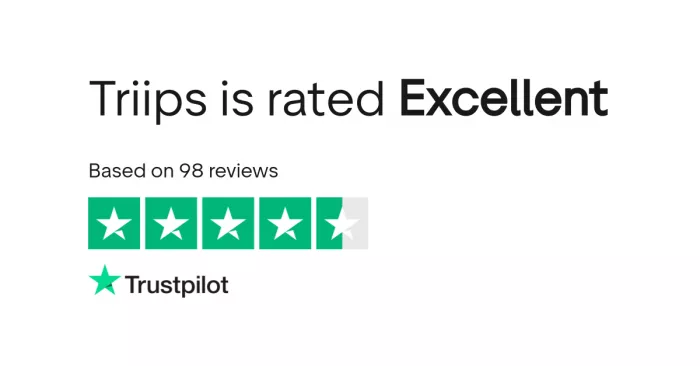
The promise is intoxicating: never pay full price for a a flight again. In a world of volatile airfare and complex pricing algorithms, this is the holy grail for travelers. Triips.com enters this crowded space not with another search aggregator, but with a bold claim powered by artificial intelligence. Their AI, they say, scans thousands of date combinations and fare trends to find price drops and hidden discounts that manual searching often misses.
But does the reality live up to the hype, and are there catches to be aware of? In an industry where "AI" is often a marketing buzzword, it's crucial to look under the hood. While many users report genuine savings, a chorus of complaints about customer service and billing practices raises important questions.
What is Triips and How Does It Actually Work?

At its core, Triips isn't a flight search engine like Google Flights. You don't plug in a specific destination and date. Instead, it operates as a proactive deal-finding service designed for travelers with flexibility.
Here’s the process:
- You Sign Up: You create an account and tell Triips your home airport or airports. This usually involves a trial period that requires payment information.
- The AI Gets to Work: Triips's systems continuously scan for flight deals departing from your selected airports. It crunches thousands of possible date combinations for countless destinations to find fares that are significantly lower than the historical average.
- Deal Alerts & Booking: When the AI finds a notable deal, it appears in your feed. Crucially, Triips does not process bookings. It is a discovery tool, not a travel agent. When you click a deal, it redirects you to book directly with the airline or a standard booking engine. This means prices aren't marked up, but it also means Triips offers no customer support for booking changes, cancellations, or any issues that arise after you click away from their site.
The key difference is its proactive approach. Traditional search engines are reactive; Triips is proactive. It finds the deal first and presents it to you as an opportunity, ideal for spontaneous travel.
Core Features Analysis: A Look at the Engine
- The AI Scanning Engine: Triips claims its AI tracks fare trends to identify price drops. This likely involves machine learning models that establish a baseline price for a given route and flag significant deviations.
- The Deal Feed: This is the main user interface. It presents a list of discovered deals from your home airport, designed for browsing and discovery rather than targeted searching.
- Subscription Model: Triips is a membership service. The subscription fee is the company's entire business model.
Be aware: the service is known for auto-enrolling users into a paid plan after a trial, so it's vital to track the expiry date if you don't intend to continue.
The Market Context: Fighting Algorithms with Algorithms

The need for a service like Triips is born from the complexity of the industry itself. The global online travel booking market is a behemoth, projected to generate nearly $1 trillion in revenue in 2025 (Statista). Airlines use incredibly sophisticated yield management systems to constantly adjust prices.
This is why the same seat on the same flight can change price multiple times a day. For consumers, it’s an opaque and frustrating system. Triips’s value proposition is to use the same weapon: technology, in the consumer's favor. It’s a compelling narrative: an AI working for you to beat the airlines' own AIs. The question is whether the execution justifies the cost.
Performance and Real-World Use Cases
The effectiveness of Triips hinges almost entirely on one factor: your flexibility. For travelers near major hubs with the freedom to travel whenever a good deal pops up, the service can unearth genuine bargains.
However, some independent reviews have flagged Triips for aggressive marketing and occasionally misleading deal presentations (YouTube Tech Appraisal). A "deal" might be for a very restrictive basic economy fare or have inconvenient layovers. Furthermore, the selection of deals can feel limited and often overlaps with alerts you could set up for free on other platforms. The primary benefit isn't necessarily finding deals that are impossible to find elsewhere, but in automating the search and presenting them conveniently.
User Experience: Is the Platform Easy to Use?
The Triips website and platform are designed with simplicity in mind. Since the primary function is to browse a feed of deals, the interface is clean and uncluttered. This minimalist approach works because the tool is single-purpose. There are no complex filters or confusing options to navigate. You set your airport and let the deals come to you.
What Are Real Customers Saying? (The Good, The Bad, and The Ugly)

Synthesizing user sentiment from platforms like Trustpilot, Reddit, and ScamAdviser reveals a divided picture.
The Good:
The service holds a generally positive Trustpilot score, and there are many verified testimonials from users who have saved hundreds of dollars on flights. For flexible travelers, the platform successfully delivers on its core promise of finding affordable, spontaneous getaways.
The Bad and The Ugly:
Despite the positive reviews, a pattern of serious complaints exists.
Surprise Charges and Cancellation Woes: The most frequent negative report involves billing. Many users express frustration with unclear cancellation policies, leading to unexpected charges after a trial period expires. Canceling the service can reportedly be a difficult process (Trustpilot).
Unresponsive Customer Service: Numerous users report that customer service is slow to respond or unhelpful when dealing with billing disputes or technical issues.
Unverified Allegations: While impossible to confirm, some online discussions allege that Triips may filter or remove negative comments from certain platforms. These claims remain unverified and should be treated with caution, but they contribute to the skepticism surrounding the brand's reputation management.
Triips vs. The Competition: A Head-to-Head Comparison
Triips’s biggest challenge isn’t other AI scanners; it's the array of powerful, free alternatives. Many savvy travelers argue that comparable deals can be found using tools like Google Flights Explore, Skyscanner, and deal sites like The Points Guy (Reddit).
The key difference is effort. Triips automates the process into a convenient feed. Free tools require more hands-on, manual searching.
| Feature | Triips | Google Flights | Going.com (Scott's Cheap Flights) |
| Primary Use | Automated, proactive deal discovery | Active, specific searching | Human-curated deal alerts (email) |
| Value Prop. | Convenience and automation | Power and comprehensive filters | Expert curation of "mistake fares" |
| Cost | Subscription Fee | Free | Freemium / Premium Subscription |
| Main Drawback | Cost, customer service issues | Requires manual effort | Limited to deals the experts find |
Pros and Cons of Using Triips
Pros:
- Saves Time: It automates the tedious process of searching for flights, which is a real benefit for busy people.
- Encourages Spontaneity: The deal feed is a great way to discover affordable travel opportunities to new places.
- Simple, Clean Interface: The platform is straightforward and easy to use.
- Can Uncover Genuine Deals: For the right user, the service does find significant discounts.
Cons:
- Recurring Subscription Cost: The value is not always justified, especially for infrequent travelers.
- Poor Customer Service Reports: A significant number of users report issues with support and billing.
- Unclear Cancellation Policies: Surprise charges after trials are a common and serious complaint.
- Value Can Be Matched by Free Tools: Dedicated users of free platforms can often find the same or similar deals with manual effort.
The Final Verdict: Is Triips Worth It in 2025?
So, is Triips a legitimate service? Yes, it is not a direct scam. It provides a real service and many users are happy with it. However, legitimacy is not the same as value or trustworthiness.
The decision to subscribe to Triips boils down to a clear trade-off: Are you willing to pay a recurring fee for the convenience of automated deal discovery?
Triips is likely a good fit for you if:
- You are a frequent, flexible traveler based near a major international airport.
- You place a high value on your time and hate the process of manually searching for deals.
- You are diligent about managing subscriptions and will remember to cancel a trial if you don't find it valuable.
You should avoid Triips if:
- You are a budget-conscious traveler who prefers using free tools.
- You travel infrequently or have fixed travel dates and destinations.
- You are wary of companies with multiple reports of poor customer service and difficult cancellation processes.
Ultimately, while Triips's AI-powered approach is technologically sound, the company's operational practices present a risk. There is no proven fraud, but buyers are cautioned to understand the service's limitations and the potential for billing headaches. For many, the manual effort of using free, powerful tools like Google Flights remains the more prudent choice.


Comments